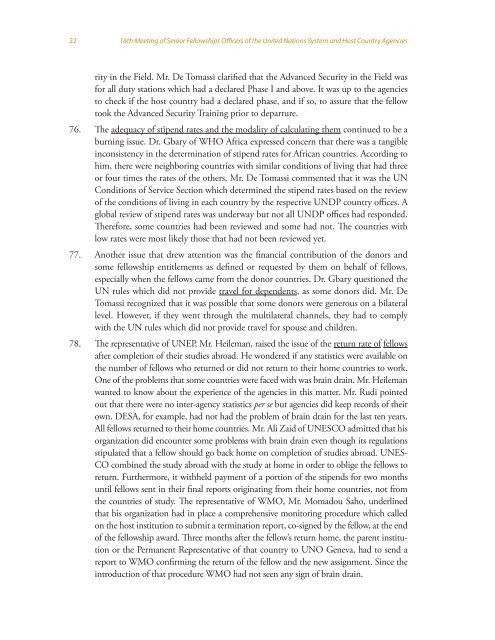16th Meeting of Senior Fellowships Officers of the ... - Development
16th Meeting of Senior Fellowships Officers of the ... - Development
16th Meeting of Senior Fellowships Officers of the ... - Development
Create successful ePaper yourself
Turn your PDF publications into a flip-book with our unique Google optimized e-Paper software.
22<br />
<strong>16th</strong> <strong>Meeting</strong> <strong>of</strong> <strong>Senior</strong> <strong>Fellowships</strong> <strong>Officers</strong> <strong>of</strong> <strong>the</strong> United Nations System and Host Country Agencies<br />
rity in <strong>the</strong> Field. Mr. De Tomassi clarified that <strong>the</strong> Advanced Security in <strong>the</strong> Field was<br />
for all duty stations which had a declared Phase I and above. It was up to <strong>the</strong> agencies<br />
to check if <strong>the</strong> host country had a declared phase, and if so, to assure that <strong>the</strong> fellow<br />
took <strong>the</strong> Advanced Security Training prior to departure.<br />
76. The adequacy <strong>of</strong> stipend rates and <strong>the</strong> modality <strong>of</strong> calculating <strong>the</strong>m continued to be a<br />
burning issue. Dr. Gbary <strong>of</strong> WHO Africa expressed concern that <strong>the</strong>re was a tangible<br />
inconsistency in <strong>the</strong> determination <strong>of</strong> stipend rates for African countries. According to<br />
him, <strong>the</strong>re were neighboring countries with similar conditions <strong>of</strong> living that had three<br />
or four times <strong>the</strong> rates <strong>of</strong> <strong>the</strong> o<strong>the</strong>rs. Mr. De Tomassi commented that it was <strong>the</strong> UN<br />
Conditions <strong>of</strong> Service Section which determined <strong>the</strong> stipend rates based on <strong>the</strong> review<br />
<strong>of</strong> <strong>the</strong> conditions <strong>of</strong> living in each country by <strong>the</strong> respective UNDP country <strong>of</strong>fices. A<br />
global review <strong>of</strong> stipend rates was underway but not all UNDP <strong>of</strong>fices had responded.<br />
Therefore, some countries had been reviewed and some had not. The countries with<br />
low rates were most likely those that had not been reviewed yet.<br />
77. Ano<strong>the</strong>r issue that drew attention was <strong>the</strong> financial contribution <strong>of</strong> <strong>the</strong> donors and<br />
some fellowship entitlements as defined or requested by <strong>the</strong>m on behalf <strong>of</strong> fellows,<br />
especially when <strong>the</strong> fellows came from <strong>the</strong> donor countries. Dr. Gbary questioned <strong>the</strong><br />
UN rules which did not provide travel for dependents, as some donors did. Mr. De<br />
Tomassi recognized that it was possible that some donors were generous on a bilateral<br />
level. However, if <strong>the</strong>y went through <strong>the</strong> multilateral channels, <strong>the</strong>y had to comply<br />
with <strong>the</strong> UN rules which did not provide travel for spouse and children.<br />
78. The representative <strong>of</strong> UNEP, Mr. Heileman, raised <strong>the</strong> issue <strong>of</strong> <strong>the</strong> return rate <strong>of</strong> fellows<br />
after completion <strong>of</strong> <strong>the</strong>ir studies abroad. He wondered if any statistics were available on<br />
<strong>the</strong> number <strong>of</strong> fellows who returned or did not return to <strong>the</strong>ir home countries to work.<br />
One <strong>of</strong> <strong>the</strong> problems that some countries were faced with was brain drain. Mr. Heileman<br />
wanted to know about <strong>the</strong> experience <strong>of</strong> <strong>the</strong> agencies in this matter. Mr. Rudi pointed<br />
out that <strong>the</strong>re were no inter-agency statistics per se but agencies did keep records <strong>of</strong> <strong>the</strong>ir<br />
own. DESA, for example, had not had <strong>the</strong> problem <strong>of</strong> brain drain for <strong>the</strong> last ten years.<br />
All fellows returned to <strong>the</strong>ir home countries. Mr. Ali Zaid <strong>of</strong> UNESCO admitted that his<br />
organization did encounter some problems with brain drain even though its regulations<br />
stipulated that a fellow should go back home on completion <strong>of</strong> studies abroad. UNES-<br />
CO combined <strong>the</strong> study abroad with <strong>the</strong> study at home in order to oblige <strong>the</strong> fellows to<br />
return. Fur<strong>the</strong>rmore, it withheld payment <strong>of</strong> a portion <strong>of</strong> <strong>the</strong> stipends for two months<br />
until fellows sent in <strong>the</strong>ir final reports originating from <strong>the</strong>ir home countries, not from<br />
<strong>the</strong> countries <strong>of</strong> study. The representative <strong>of</strong> WMO, Mr. Momadou Saho, underlined<br />
that his organization had in place a comprehensive monitoring procedure which called<br />
on <strong>the</strong> host institution to submit a termination report, co-signed by <strong>the</strong> fellow, at <strong>the</strong> end<br />
<strong>of</strong> <strong>the</strong> fellowship award. Three months after <strong>the</strong> fellow’s return home, <strong>the</strong> parent institution<br />
or <strong>the</strong> Permanent Representative <strong>of</strong> that country to UNO Geneva, had to send a<br />
report to WMO confirming <strong>the</strong> return <strong>of</strong> <strong>the</strong> fellow and <strong>the</strong> new assignment. Since <strong>the</strong><br />
introduction <strong>of</strong> that procedure WMO had not seen any sign <strong>of</strong> brain drain.

















